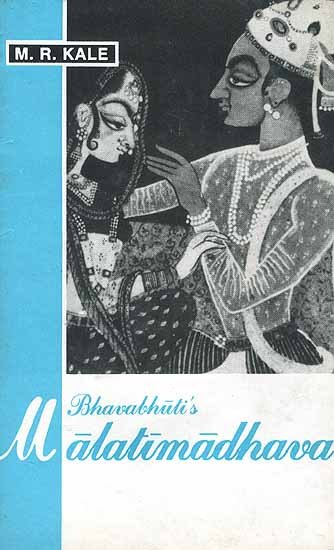Malatimadhava (study)
by Jintu Moni Dutta | 2017 | 52,468 words | ISBN-10: 8120813057 | ISBN-13: 9788120813052
This page relates ‘Karuna Rasa (The pathetic sentiment)’ from the English study on the Malatimadhava of Bhavabhuti:—A Prakarana type of Drama in ten acts revolving around the love-story of Malati (from Padmāvatī) and Madhava (from Vidarbha). This study discusses the history of its author and the literary, social, religious, historical and cultural aspects of the Malatimadhava.
Part 1.3b - Karuṇa Rasa (The pathetic sentiment)
The Karuṇa rasa or pathetic sentiment arises from the permanent mood of śoka or sorrow. It grows from vibhāvas or determinants such as affliction under a curse, separation from dear ones, loss of wealth, death, captivity, flight accidents or any other misfortune. This rasa is represented by means of anubhāvas or consequents such as shedding tears, lamentation, dryness of the mouth, change of colour, droopping limbs, being out of breath, loss of memory and the like. Vyabhicāribhāvas connected with this rasa are indifference, languor, anxiety, yearning, excitement, sadness, illness, weeping etc[1].
Bhavabhūti is well-versed in delineation of the sentiment of pathos. Though in the Mālatīmādhava Bhavabhūti has delineated the sentiment of pathos as subordinate sentiment, yet the sentiment of pathos pervades more or less in all the acts. In the 2nd act of the Mālatīmādhava the sentiment of pathos reveals in the speech of Mālatī when she is betrothed to Nandana by her father where she loves Mādhava.[2] Mālatī has evinced deep sorrow at her father’s decision.[3] Mālatī expresses her anxiety by saying that her father has offered her as a gift to the king and her father sets a high value on the king’s pleasure and not on Mālatī.[4] Here, Mālatī is ālambanavibhāva, its uddīpanavibhāva is separation of Mālatī from Mādhava, anubhāva is the lamentation of Mālatī and its vyabhicāribhāva is the feeling of unhappiness.In the 4th act also, Mālatī soliloquises that the fruit of her desire for life has now ripened, the purpose of her existence has ended,the cruelty of her father too has been fully proved by his merciless conduct and a result of the cruel beginning of fate has been ensured. She finds nobody to blame and considers herself as luckless[5]
Moreover, in the 5th act a real picture of sorrow through the speech of Mālatī is found when Kapālakuṇḍalā and Aghoraghaṇṭa have prepared Mālatī as a victim.[6] Delineation of Karuṇa rasa also reveals in the verse bhāraḥ kāyo jīvitaṃ vajrakīlam……………… [7] etc. where the deep lamentation of Makaranda for Mādhava is found where he decides to put an end of his life by throwing himself in to the Pātālavati river. Here, Madhava is ālambanavibhāva, love longing of Mādhava is uddīpanavibhāva, lamentation of Makaranda is the anubhāva and misery of Makaranda is the vyabhicāribhāva.
In the 10th act it has been seen that Kāmandakī , Lavaṅgikā as well as Madayantikā each one expresses deep grief at the absence of Mālatī. In the meantime, they resolve to put an end to their lives by throwing themselves from the top of a hill begirt to the Madhumati river. Moreover, Bhūrivasu unable to bear Mālatī’s separation approaches the mountain Suvarṇavindu with intention to cast himself into fire. These descriptions prove the delineation of Karuṇa rasa in the Mālatīmādhava. In this way, in the Mālatīmādhava Bhavabhūti has delineated a picture of pathos which is very much touching.
Footnotes and references:
[1]:
atha karuṇo nāma śokasthāyibhāvaprabhavaḥ / sa ca śāpakleśa vinipatiteṣṭa janaviprayoga vibhavanāśavadhabandha vidravopadhāta vyasanasamyogādibhir vibhāvaiḥsamupajāyate/ tasyāśrupātaparidevana mukhaśoṣaṇa vaivarṇyastrasta gātratā niśvāsasmṛtilopādibhiranubhāvai rabhinayaḥ prayoktavyaḥ / vyabhicāriṇaścāsya nirvedaglanicintotsuky āvegabhramohaśramabhayaviṣāda dainyavyādhijaratonmādapasmāratrāsālasyamaraṇastambhavepathuvai varṇyāśrusvarabhedādayaḥ //
–Nāṭyaśāstra,VI.p.317
[2]:
hā hatāsmi samupasthitānarthavajrapatanā mandabhāginī / Mālatīmādhava, II.p.56
[4]:
[5]:
[6]:
hā tāta niṣkarūṇa eṣa idānīṃ te narendracittārā dhanopakaraṇaṃ jano vipadyate/
hā amba snehamayahṛdaye hatāsi daivadurvilasitena hā mālatīmaya jivite mama kalyāṇasādhanaikamuktasakalavyāpāre bhagavati cirasya jñāpitāsi duḥkham snehenahā priyasakhi lavaṅgike svapnāvasaramātradarśanāhaṃ te samvṛttā/
Ibid.,VI. p. 109
